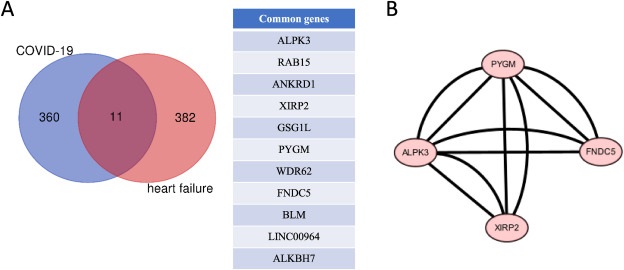Study Identifies Key Genes In COVID-19-Associated Heart Failure With Two Critical Gene: PYGM And BLM Identified As Potential Intervention Targets
COVID-19 News - Genes - COVID-19-Associated Heart Failure - PYGM - BLM Jul 30, 2023 1 year, 8 months, 2 weeks, 5 days, 15 hours, 20 minutes ago
Scientists identify 11 genes associated with COVID-19 associate heart failure including ALPK3, RAB15, ANKRD1, XIRP2, GSG1L, PYGM, WDR62, FNDC5,BLM, LINC009 6 And ALKBH7
COVID-19 News: The COVID-19 pandemic, caused by the severe acute respiratory syndrome coronavirus 2 (SARS-CoV-2), has wreaked havoc globally, leading to millions of infections and deaths. As scientists race to understand the complexities of the virus, emerging evidence suggests that COVID-19 can have severe implications beyond the respiratory system. One alarming revelation is the potential for COVID-19 to induce heart failure, a critical stage in the progression of various cardiovascular diseases as reported in many past
COVID-19 News coverages.
 Identification of common genes of COVID-19-related heart failure. A. Venn diagram of common genes in
Identification of common genes of COVID-19-related heart failure. A. Venn diagram of common genes in
COVID-19-relatedcrucial modules and heart failure-related crucial module. B. MCODE analysis results
Researchers at Changhai Hospital, Naval Medical University, Shanghai, China, embarked on a new study to shed light on the biological processes and key targets involved in COVID-19-associated heart failure. The goal was to identify potential intervention strategies that could mitigate the impact of this deadly complication. Utilizing state-of-the-art bioinformatics analysis, the study has unveiled fascinating insights into the genetic underpinnings of this condition.
Heart Failure - A Looming Threat in COVID-19
Even before the pandemic, acute respiratory infections like influenza and respiratory syncytial virus were known to contribute to cardiovascular diseases. Individuals with pre-existing cardiovascular conditions are at higher risk of severe outcomes after contracting COVID-19. Notably, SARS-CoV-2 infection has been associated with cardiac complications, including elevated cardiac stress biomarkers, arrhythmias, and heart failure. Heart failure, the end stage of various cardiovascular diseases, poses unique challenges in the context of COVID-19.
Despite this mounting evidence, the specific biological processes underlying COVID-19-associated heart failure have remained elusive. To bridge this knowledge gap, the research team harnessed the power of bioinformatics analysis, aiming to pinpoint crucial genes and pathways implicated in the development of heart failure in COVID-19 patients.
Unraveling the Genetic Secrets: WGCNA and Key Genes
The study team obtained three heart failure datasets and three COVID-19 datasets from the Gene Expression Omnibus (GEO) database. To eliminate confounding factors and enhance the reliability of the analysis, they applied the Surrogate Variable Analysis (SVA) algorithm to remove batch effects. Next, they employed weighted gene co-expression network analysis (WGCNA) to explore the intricate interactions between genes and identify key modules associated with heart failure and COVID-19.
Intriguingly, the analysis revealed eleven shared genes that were likely involved in COVID-19-associated heart failure. Among these genes were ALPK3, RAB15, ANKRD1, XIRP2, GSG1L,PYGM, WDR62, FNDC
5, BLM, LINC0096, and ALKBH7.
These shared genes represented the most promising candidates for potential intervention targets in COVID-19-related heart failure.
Unlocking the Biological Pathways - Enrichment Analysis
To gain a deeper understanding of the biological processes related to COVID-19-associated
heart failure, the researchers conducted Gene Ontology (GO) and Kyoto Encyclopedia of Genes and Genomes (KEGG) enrichment analyses on the identified shared genes. The results were nothing short of intriguing.
The shared genes exhibited enrichments in essential biological processes, including cardiac muscle tissue morphogenesis, carbohydrate transmembrane transporter activity, DNA damage response, and myoblast differentiation, among others. Additionally, the shared genes were prominently associated with starch and sucrose metabolism, homologous recombination, Fanconi anemia pathway, glucagon signaling pathway, insulin resistance, insulin signaling pathway, and necroptosis.
Furthermore, the enrichment analysis hinted at a possible link between COVID-19-related heart failure and insulin resistance, a well-known factor in cardiovascular diseases.
PYGM and BLM - Potential Game-Changing Intervention Targets
Within the constellation of shared genes, two genes, PYGM (encoding cardiomyocyte-related muscle glycogen phosphorylase) and BLM (BLM RecQ Like Helicase), stood out as particularly crucial in COVID-19-associated heart failure. PYGM plays a vital role in maintaining glucose homeostasis and energy production during physical activity, making it a potential target for intervention strategies. On the other hand, BLM is an ATP-dependent DNA helicase involved in DNA replication and repair, raising exciting possibilities for therapeutic interventions.
A Step Towards Tailored Interventions
While this study has provided valuable insights into COVID-19-associated heart failure, there are certain limitations that warrant further investigation. The findings require experimental validation to strengthen their significance, and the lack of specific clinical information in the datasets restricts the comprehensive understanding of the disease's clinical relevance.
Nevertheless, the identification of potential intervention targets, particularly PYGM and BLM, is a significant leap forward in the battle against COVID-19-related heart failure. Future research can delve deeper into the molecular mechanisms of these genes and explore their applicability in cardiovascular and respiratory disease management.
In conclusion, this study marks a crucial step in unraveling the mysteries of COVID-19-associated heart failure. By unlocking the genetic secrets and shedding light on the underlying biological processes, researchers are paving the way for tailored and effective intervention strategies.
The study findings were published in the peer reviewed journal: Heliyon
https://www.cell.com/heliyon/fulltext/S2405-8440(23)05783-3
For the latest
COVID-19 News, keep on logging to Thailand
Medical News.
